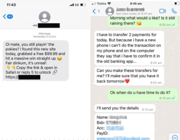CHOICE Shonky Awards expose social media giant for dubious practices in 2024
- Replies 8
As we navigate the digital age, it's essential to stay informed about the companies and products that may not have our best interests at heart.
The CHOICE Shonky Awards serve as an annual reminder that not all that glitters is gold, especially when it comes to consumer products and services.
This year, the spotlight has been cast on some big names, and the revelations might just make you think twice about where you place your trust—and your money.
The CHOICE Shonky Awards are designed to highlight the ‘shonkiest products and companies’ of 2024 by naming five standout ‘winners’ for their dubious practices.
‘We'd actually love to not have to give awards like this out, but sadly, that is not the case,’ CHOICE Chief Executive Ashley de Silva stated.
‘We want to warn consumers about those products, also putting the spotlight on the practices of retailers and manufacturers, asking them to do better.’

Meta, the parent company of social media behemoths like Facebook, Instagram, and WhatsApp, has been handed a Shonky Award for what CHOICE deems ‘inadequate action’ on scams.
CHOICE reported that during its investigation of Meta platforms, it flagged three suspicious Facebook ads, with one staying live for at least four days.
Additionally, the consumer group noted that one account was permitted to repost an almost identical ad shortly after.
‘Meta have told us that they don't want scams occurring on their platforms,’ Mr de Silva said.
‘But the reality is, based on the level of investment and steps that they're taking—we're seeing 76 per cent of those reported scam losses are occurring on their platforms.’
‘Clearly, whatever they're doing isn't producing the result they want or claim to want,’ he added.
Despite the company's claims of investing over $20 billion since 2016 to enhance safety and security, the statistics paint a different picture.
Meta stated that approximately 40,000 employees across the company were dedicated to addressing the issue.
Chris Sheehan, the Head of Group Investigations at National Australia Bank, leads a team focused on investigating scams that affect customers, many of which occur on social media platforms.
‘Scams are the curse of the digital age,’ he remarked.
‘It's been called out as an epidemic…and I think that's correct.’
‘We need to see more work, more effort, out of the technology companies,’ Mr Sheehan continued.
Mr Sheehan explained that NAB employs large teams of hundreds of staff to combat social media scams, actively monitoring for an estimated 18,000 to 20,000 scam payments each year.
‘Some typical things that we've seen are WhatsApp scams,’ he pointed out.
‘People are getting WhatsApp messages: “Hey, mum, I've lost my phone. Can you send me some money? Because I've got to pay for my groceries or my rent?” People fall for those.’
‘Recently, you've seen Taylor Swift and Coldplay in Australia—and lots of fake ticket scams operating on platforms like Facebook, Marketplace, Gumtree, Google and others,’ Mr Sheehan added.
In October, Meta revealed it was testing facial recognition technology to help prevent so-called ‘celeb-bait scams’, where criminals impersonate high-profile figures like David Koch, Dick Smith, or Andrew Forrest.
Additionally, in June, the company announced that it would require advertisers to have a verified phone number linked to their ads before they could publish them.
In the second quarter of 2024, Meta reported removing 322 million pieces of spam content from Facebook, most of which were taken down before being flagged by users.
Chris Sheehan, who has nearly 30 years of experience with the Australian Federal Police, offered straightforward advice for social media users looking to avoid scams.
‘Don't believe anything that you see in a digital environment,’ he advised.
‘If it's presented to you in a digital environment, including email, text messages, WhatsApp messages, other messaging services there—conduct your own inquiries.’
‘And think twice before you commit to sending any money,’ he added.
You can check out the full list of CHOICE Shonky Awards 'winners' here.
In light of the recent revelations from the CHOICE Shonky Awards, where Meta was called out for its failure to address scams on its platform, the Australian government and other institutions are ramping up their efforts to fight back against social media fraud.
As part of these ongoing efforts, programs are now more active than ever in targeting fraudsters who exploit platforms like Facebook and Instagram, preying on unsuspecting Australians.
For example, the Australian Communications and Media Authority (ACMA) is collaborating with industry leaders to implement measures aimed at tackling these pervasive scams.
 So, dear readers, have you had any experiences with the products or companies mentioned? Or perhaps you've encountered other questionable practices in your online adventures? Share your stories with us in the comments below, and let's continue to support each other in staying savvy and safe in the digital age.
So, dear readers, have you had any experiences with the products or companies mentioned? Or perhaps you've encountered other questionable practices in your online adventures? Share your stories with us in the comments below, and let's continue to support each other in staying savvy and safe in the digital age.
The CHOICE Shonky Awards serve as an annual reminder that not all that glitters is gold, especially when it comes to consumer products and services.
This year, the spotlight has been cast on some big names, and the revelations might just make you think twice about where you place your trust—and your money.
The CHOICE Shonky Awards are designed to highlight the ‘shonkiest products and companies’ of 2024 by naming five standout ‘winners’ for their dubious practices.
‘We'd actually love to not have to give awards like this out, but sadly, that is not the case,’ CHOICE Chief Executive Ashley de Silva stated.
‘We want to warn consumers about those products, also putting the spotlight on the practices of retailers and manufacturers, asking them to do better.’

The CHOICE Shonky Awards have criticised Meta, the parent company of Facebook, Instagram, and WhatsApp, for failing to take sufficient action against scams. Credit: CHOICE
Meta, the parent company of social media behemoths like Facebook, Instagram, and WhatsApp, has been handed a Shonky Award for what CHOICE deems ‘inadequate action’ on scams.
CHOICE reported that during its investigation of Meta platforms, it flagged three suspicious Facebook ads, with one staying live for at least four days.
Additionally, the consumer group noted that one account was permitted to repost an almost identical ad shortly after.
‘Meta have told us that they don't want scams occurring on their platforms,’ Mr de Silva said.
‘But the reality is, based on the level of investment and steps that they're taking—we're seeing 76 per cent of those reported scam losses are occurring on their platforms.’
‘Clearly, whatever they're doing isn't producing the result they want or claim to want,’ he added.
Despite the company's claims of investing over $20 billion since 2016 to enhance safety and security, the statistics paint a different picture.
Meta stated that approximately 40,000 employees across the company were dedicated to addressing the issue.
Chris Sheehan, the Head of Group Investigations at National Australia Bank, leads a team focused on investigating scams that affect customers, many of which occur on social media platforms.
‘Scams are the curse of the digital age,’ he remarked.
‘It's been called out as an epidemic…and I think that's correct.’
‘We need to see more work, more effort, out of the technology companies,’ Mr Sheehan continued.
Mr Sheehan explained that NAB employs large teams of hundreds of staff to combat social media scams, actively monitoring for an estimated 18,000 to 20,000 scam payments each year.
‘Some typical things that we've seen are WhatsApp scams,’ he pointed out.
‘People are getting WhatsApp messages: “Hey, mum, I've lost my phone. Can you send me some money? Because I've got to pay for my groceries or my rent?” People fall for those.’
‘Recently, you've seen Taylor Swift and Coldplay in Australia—and lots of fake ticket scams operating on platforms like Facebook, Marketplace, Gumtree, Google and others,’ Mr Sheehan added.
In October, Meta revealed it was testing facial recognition technology to help prevent so-called ‘celeb-bait scams’, where criminals impersonate high-profile figures like David Koch, Dick Smith, or Andrew Forrest.
Additionally, in June, the company announced that it would require advertisers to have a verified phone number linked to their ads before they could publish them.
In the second quarter of 2024, Meta reported removing 322 million pieces of spam content from Facebook, most of which were taken down before being flagged by users.
Chris Sheehan, who has nearly 30 years of experience with the Australian Federal Police, offered straightforward advice for social media users looking to avoid scams.
‘Don't believe anything that you see in a digital environment,’ he advised.
‘If it's presented to you in a digital environment, including email, text messages, WhatsApp messages, other messaging services there—conduct your own inquiries.’
‘And think twice before you commit to sending any money,’ he added.
You can check out the full list of CHOICE Shonky Awards 'winners' here.
In light of the recent revelations from the CHOICE Shonky Awards, where Meta was called out for its failure to address scams on its platform, the Australian government and other institutions are ramping up their efforts to fight back against social media fraud.
As part of these ongoing efforts, programs are now more active than ever in targeting fraudsters who exploit platforms like Facebook and Instagram, preying on unsuspecting Australians.
For example, the Australian Communications and Media Authority (ACMA) is collaborating with industry leaders to implement measures aimed at tackling these pervasive scams.
Key Takeaways
- The CHOICE Shonky Awards have highlighted Meta, the parent company of Facebook, Instagram, and WhatsApp, for its inadequate action on scams.
- CHOICE's investigation into Meta's platforms revealed that flagged scam ads remained live for days, and similar scams were reposted shortly after being taken down.
- National Australia Bank's Head of Group Investigations, Chris Sheehan, underscored that scams are prolific on social media and more effort is required from tech companies to combat them.
- Despite Meta's investment in safety and security and efforts like facial recognition technology for ad verification, scams continue to plague users, indicating the need for consistent vigilance in digital environments.







